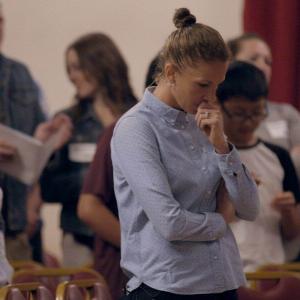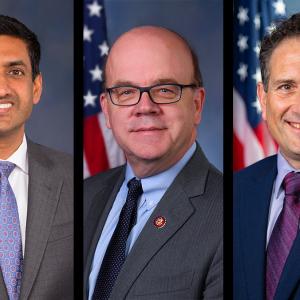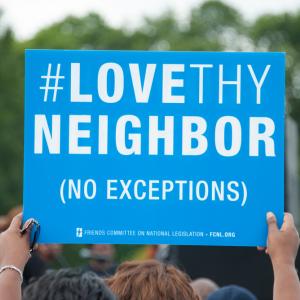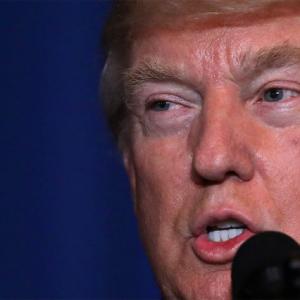
Guthrie Graves-Fitzsimmons is the author of Just Faith: Reclaiming Progressive Christianity. He currently serves as a nonresident fellow with the Faith and Progressive Policy Initiative at the Center for American Progress. His writing on religion, politics, and pop culture can be found at CNN, NBC News, and other outlets. He lives in Louisville, Ky., with his husband.
Posts By This Author
Julie Rodgers Quit Trying to ‘Pray Away’ Who God Made Her To Be
The spiritual and psychological harm of conversion therapy is indeed intense. Rodgers gives an insider’s account in her new memoir Outlove and Pray Away, which premieres on August 3. Her survival story will appeal to readers and viewers whether they are LGBTQ and Christian, one or the other, or none of the above.
How Faith Fuels the Anti-War Stances of 3 U.S. Representatives
I interviewed Rep. Ro Khanna (D-Calif.) by phone on the same day he voted in favor of the resolution. He spoke about how his faith, "Gandhian Hinduism," informed his anti-war views. I was struck during our interview about the diversity of religious views that informed anti-war activism. I asked Khanna's staff to recommend other members of Congress to interview. Rep. Jim McGovern (D-Mass.), who is Catholic, and Rep. Andy Levin (D-Mich.), who is Jewish, both shared their own thoughts in written responses to the same questions.
Called to Serve — and Resist
While Christian witness doesn't mean necessarily going into seminary, Waggoner and Perry have both found, in pastoral training, their voices for this time.
Our Democracy Hangs in the Balance. Will You Pray With Me?
The second prayer request is for each member of the Special Counsel’s team. As Christians, we are instructed not just to pray for systemic issues, but for individual people. The Special Counsel team is not an amorphous blob — it is a set of veteran prosecutors.
How Does Just War Theory Apply to Strikes in Syria?
The two major streams of Christian engagement on war are pacifism and just war theory, which comes out of Catholic social teaching. The pacifist response to Syria strikes is clearly opposed. As for the just war analysis, it takes a little explaining, but reaches the same conclusion.
Request the Floor: Follow Samantha Power's Example if You're Outraged by Atrocities in Aleppo
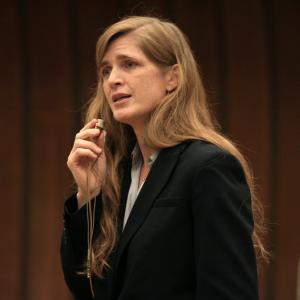
Samantha Power. Image via United States Mission Geneva
Withstanding some unforeseen breakthrough, Power will not succeed in persuading Russia, Iran, and the Assad regime in Syria. Her plea is passionate, but likely not a winning argument. The best arguments don’t always win. But I believe I know why she still fights so hard, and it’s a lesson for all of us who care.
The Beautifully Christian Vision of 'Star Trek'

Image via catwalker/Shutterstock.com
The future for Roddenberry is not homogenous. Differences are embraced, not erased. Crews made up of different species, sexual orientations, genders, ages, and abilities each contribute in their own way to success of the ship’s mission.
The future envisioned by Star Trek is one of bringing more and more people into community, embracing difference, and proclaiming the entire society’s benefit to increased diversity. Star Trek, if we’re going to be blunt, is better known for what Christianity should be known for in our 21st century context
Megachurch Pastor Joel Hunter on Nightclub Shooting: 'I've Got to Go Back and Examine My Own Heart'
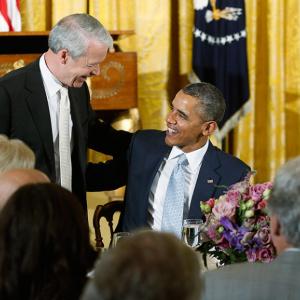
Joel Hunter at an Easter prayer breakfast at the White House. Image via REUTERS/Jonathan Ernst/RNS
In the aftermath of the shooting at an Orlando, Fla., gay club, diverse leaders in the city have reached out to the LGBT community. One surprising photo emerged: evangelical megachurch pastor Joel Hunter shaking hands with Equality Florida’s Carlos Smith. It was a simple gesture, captured by a local newspaper reporter, but one with deep symbolic meaning.
The Prophet Returns, Strumming Her Guitar

Image via Mred32/Flickr
Maines joined the ranks of the great singer-prophets standing and singing against the war in Iraq, but her vocal commitments extend to many important causes including criminal justice reform, domestic violence, and LGBTQ rights. In 2013, she told USA Today, “I'm pro-gay marriage. Pro-gay everything,” and took on the NRA in a series of tweets. She has as many political opinions as #1 country singles, and has shown no signs of slowing down: She recently added Ted Cruz to the list of people she’s ashamed are from Texas.
American Christians Could Take a Lesson From Angela Merkel

Image via 360b / Shutterstock.com
Time magazine’s 2015 “Person of the Year” is a self-identified conservative Christian, but not one of the many running for president of the United States. While the dynamics of faith and politics are different in Europe, German leader Angela Merkel is an example of a conservative Christian living out her faith in the public square quite differently than we see in the U.S.
Time, which calls her “Chancellor of the Free World,” characterizes her strong leadership of economic and political crises in Europe as “no flair, no flourishes, no charisma, just a survivor’s sharp sense of power and a scientist’s devotion to data.” She may be a quantum chemist, but she’s also an Evangelical Lutheran preacher’s kid with an unwavering faith.
To Move Beyond Fear, Change the Song
I despair for my country, which seeks to turn its back on refugees. I despair for my fellow Christians, who believe followers of other creeds deserve less compassion. I despair for leaders who blame all members of a religion for the acts of extremists. I certainly hope that logic doesn’t apply to me.
I searched for the right music for the mood. Bruce Springsteen’s “Devils and Dust” captured my mood perfectly. Listen to the chorus, “I got God on my side / And I'm just trying to survive / What if what you do to survive / Kills the things you love / Fear's a powerful thing, baby / It can turn your heart black you can trust / It'll take your God filled soul / And fill it with devils and dust.”
Two Reasons Why War-Weary Christians Must Care About Kunduz

Image via severesid/Shutterstock.com
I must confess: until I learned that my country had committed a crime against humanity there, I had never heard of the city of Kunduz. I suspect many of my fellow Americans hadn’t either — even during the height of the U.S. war in Afghanistan, only 17 percent of young Americans could find Afghanistan on a map.
This must change.
Especially for those of us who have few memories of American political life before the terrorist attacks on September 11, 2001, news from Afghanistan has been a steady drumbeat of ups and downs. The war — which has little to no effect on the day-to-day lives of Americans (other than, proponents of the war would argue, protecting us from the effects of terrorism in the United States) — seems removed from lives. And that’s reasonable. New world events have moved our attention away, and war weariness has long since set in as the U.S. involvement in Afghanistan drags on.
Even for Christians in the United States committed to political advocacy and public witness, other issues have long since taken the place of caring about Afghanistan.
But two reasons stand out for why war-weary Christians in the U.S. must care about recent events in Kunduz.
Trump's Rotten Fruit

Image via Marcell Mizik/Shutterstock
"What would Trump do?" appears to be a question his growing flock asks themselves, even when their answer leads to a crime.
On Aug. 19, two brothers ambushed a homeless man in Boston because he was Hispanic — "inspired in part by GOP presidential candidate Donald Trump," the Boston Globe reported.
One brother is said to have told police, "Donald Trump was right, all these illegals need to be deported."
Folks acting out in the name of Trump necessitates two questions: how much is Trump culpable for what others do in his name, and what is our response as Christians?
Iran Nuclear Deal: Strategic, Scientific — and Christian

Flags aligned for photo at the U.N. in Vienna on July 14. Photo by European External Action Service / Flickr.com
Later this week, President Obama will deliver a major speech promoting the Iran nuclear agreement at American University. I’m looking forward to the speech, both as an AU alum and someone closely following the upcoming Senate vote on the nuclear agreement. We know President Obama will make the strategic and scientific cases for the deal; I hope he makes the moral case as well.
President Obama has twice chosen the university in northwest D.C. to deliver major speeches, but it was also the site of President Kennedy’s landmark speech on peace and nuclear disarmament in 1963, where he declared, “While we proceed to safeguard our national interests, let us also safeguard human interests” and “the elimination of war and arms is clearly in the interest of both.”
GOP Convention’s Religious Leaders Agree on Immigration Reform
If you blink, you might miss the fact that the religious luminaries offering prayers at the Republican National Convention agree on a surprising topic: the need to welcome immigrants and pass immigration reform.
The views of these religious leaders differ sharply from the Republicans’ own platform. Guided by the likes of Kansas Secretary of State Kris Kobach, the brains behind state-level anti-immigrant laws, the GOP draft platform takes a hardline stance on immigration.
But the Episcopal, evangelical Protestant, Greek Orthodox and Catholic leaders chosen to lead the RNC in prayer beg to differ.
